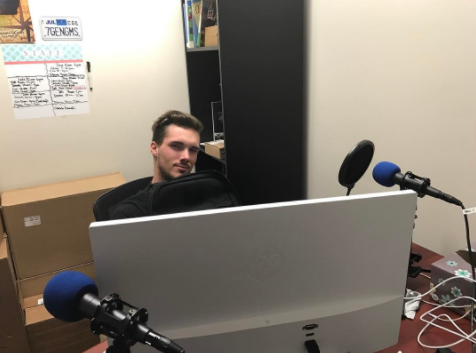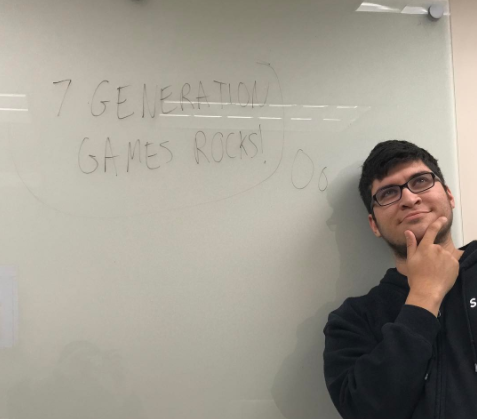According to PBS, internships are going away or going remote in the odd, new normal. With many universities and colleges going remote and even dropping standardized test requirements, higher ed is set to move forward despite the odds.

This is Devon. He’s one of our interns. In fact, he’s one of our two interns named Devon.
Have no fear, future intern. Your best bet right now is to keep applying to internships. Though things might sound tough in the news, stay optimistic.
I’ve hired a fair number of interns, I talk to people who’ve hired a fair number of interns, and I’ve interned several times over.
Here are helpful tips to getting an internship during COVID-19.
Six Tips to Get That Internship
1. Apply early. Really good internships aren’t looking to hire candidates at the last second. That means you shouldn’t be looking for an internship at the last second. In fact, some of the big financial, major news media and larger corporate internship application deadlines are long past (you should have been on top of things in the winter if you wanted a summer internship). Most other places will be filling their internship openings for the fall in the next few weeks – yes, even smaller startups. That means you should do what your parents have been likely nagging you to do and get on it now!
2. Follow directions as to how to apply. If the posting says, “Please email resume and briefly explain (300 words or less) in the body of the email why you would be a fit for this position,” do that. Don’t only send a resume. It will just go in the trash. If you go 301 words, that’s probably fine. If you run up over 1,000, you’re not showing that you go above and beyond – you’re showing that you can’t follow directions.
3. Don’t use a form letter. Do tailor your cover letter and email query for that specific job posting. Yes, that means you’re going to have to rework – often almost fully rewrite – your letter for every position to apply for. If you think the hiring manager won’t be able to tell that you just plugged in the company name and the internship title, you are wrong. Hiring managers can spot a form letter a mile away. (Don’t get me started on letters that don’t make efforts to plug in the position/company name and just go with “this position/your company.” It’s like you’re not even trying – oh wait, you aren’t.) Extra tip: Create different versions of your resume (i.e. a social media marketing resume vs. a standard marketing resume) that highlight different skill sets for different positions.

This is Luis. He was a really good intern. He’s not an intern anymore because we hired him to be a full-time developer.
4. Make sure you’re qualified. Yes, an internship should provide an opportunity to learn and not just be free labor. It shouldn’t require the same skill set of a mid-level full-time position. But it may very well require a baseline set of skills. If you have zero baseline skills required for the job, then do not apply. For example, if it’s a programming position and it says, “Candidate must know HTML,” and all you know about HTML is that they are letters in the alphabet, then don’t apply. Even if you Googled and you now know it stands for “Hypertext Markup Language,” do not apply. On the off chance you do get hired, this will be a recipe for disaster. Because sometimes you can’t “fake it until you make it” and instead you will be discovered to be a fraud. No one wants that. You’ll probably end up getting fired. The company is going to be unhappy because you can’t do the work they hired you to do and now they don’t have an intern for that spot. You’ll have wasted everyone’s time. I’ve never seen those situations end well. Now, if it says you need to know C# and you know C++ and Java, then sure, apply and mention this in your customized email (see above) and explain why you think you could meet that requirement. (And again, if you think that Java applies to coffee, it’s not the internship for you.)
5. Apply for the internship listed. If the internship says the position is for someone who can work 15 hours a week, don’t apply but say you’d like it to be full time. If it says you have to work out of the office, don’t apply but say you’d like to work remote half of your shifts. If it says that you have to adhere to a Monday to Friday schedule, don’t apply but say you’d need to work Saturdays. If the internship is for a developer, then don’t apply and say you’re interested in sales. (If they wanted a sales intern, they would have posted for a sales intern.)
6. Have an idea of what it is the company does. This seems like a no-brainer, but early in the 7 Generation Games intern hiring process, I reached a point where I started including a line in all internship postings, “FYI, please check out our website before you apply so you know a bit about our company and games (www.7generationgames.com).” I bold, underline and italicize it because while it might seem obvious, obviously to some people, it’s not. It’s OK to ask specific questions about the company, what department you’d be in, or the position, but not a variation of “So, what is it that you guys do again?” On the bright side, when you consider that you’re going to be going up against some of those “what do you do again?” applicants, doing your homework will make you look like a standout.
Helpful Hints
Look for remote networking opportunities. Both your school and companies you like may now offer video conferences, online “fireside” chats, and webinars. Remote networking and employment will be a mainstay for the foreseeable future. Best adapt and adjust now.
Reach out to companies, even now. See if the company you’re interested in has internships listed. Check their site. Check where they list their job openings/their careers page. That said, if you can’t find an opening and are interested, see if you can find someone who looks like a good person to contact (i.e. relevant to the department you are interested in) and send a polite email asking if they have internship openings and, if so, how to apply. Literally 1-2 sentences.
One follow-up is fine. Ten follow-ups is overboard. If they’re interested, they’ll get back to you. If they’re busy and they don’t get back to you immediately, sending them 50 follow-ups is the surest way to ensure that they are no longer interested in you.
The devil is in the details. Run spellcheck on your resume and cover letter/email. (Tip: Have a sharp friend review your resume.) Spell names correctly. One little typo isn’t likely going to be a make-or-break, but –just like with follow-ups – 10 will probably send your application straight to the trash folder.
Consider who you’re up against. Competition is up. If you’re reading this and thinking, “I’m graduating in the middle of a pandemic,” the answer is the people you’re up against for internships – meaning if you don’t do any of these things and you have some basic experience and willingness to learn, you still got a good chance at landing an internship. Be flexible. Be open. But you’ve got to apply, which brings me back to where we started at Point No. 1.
